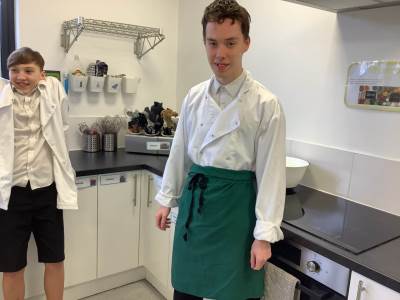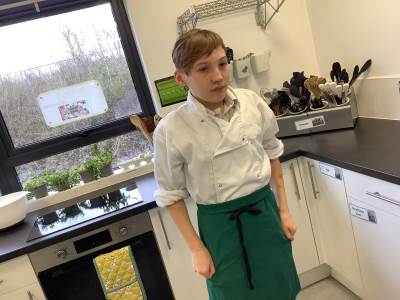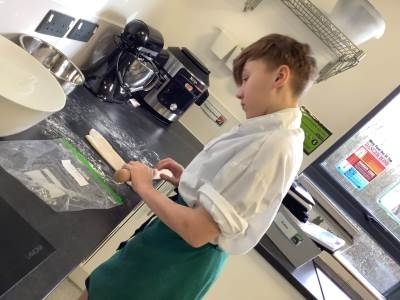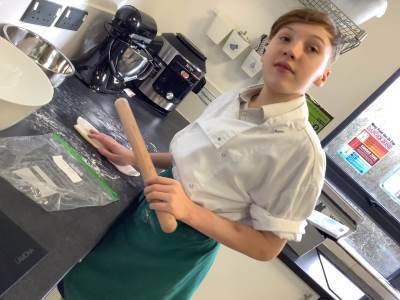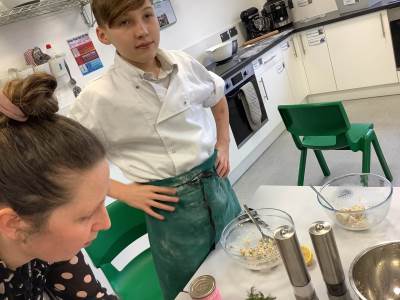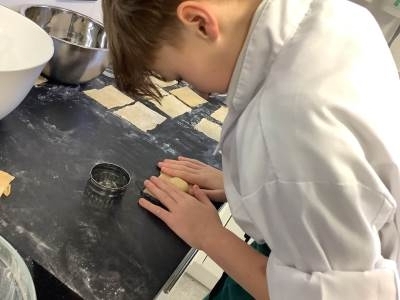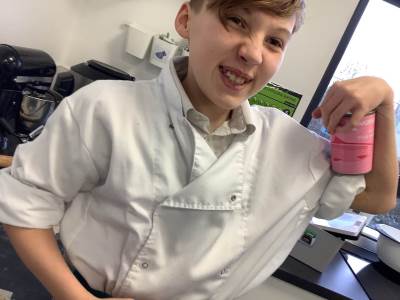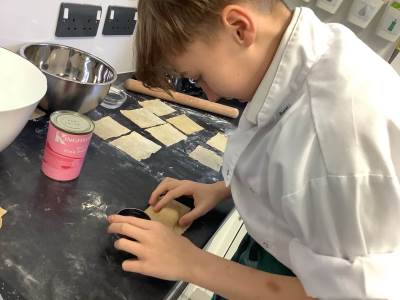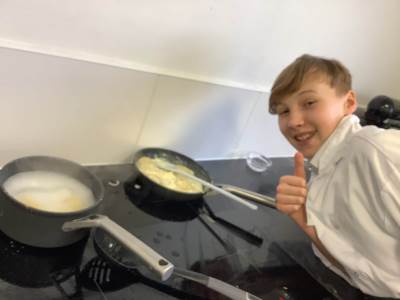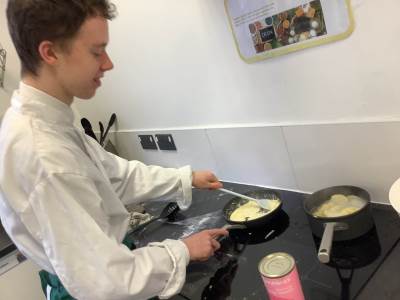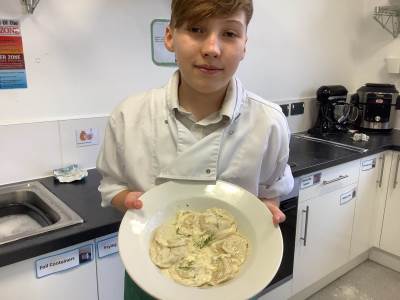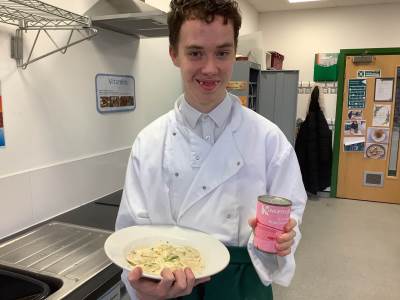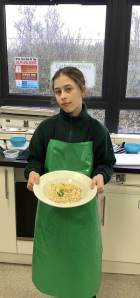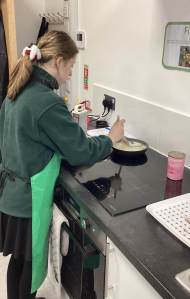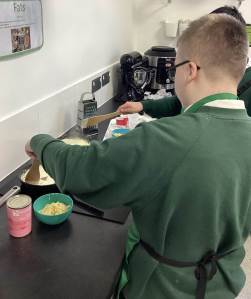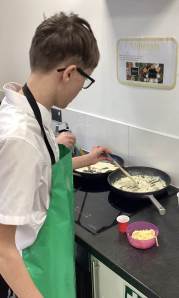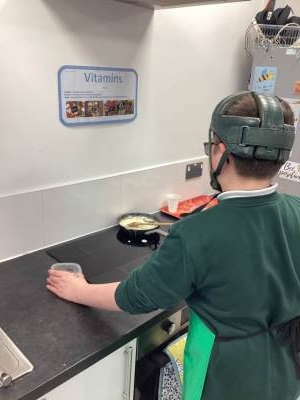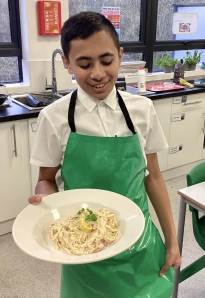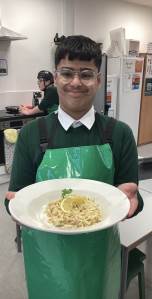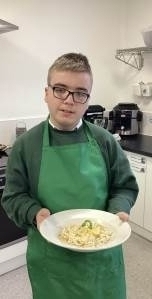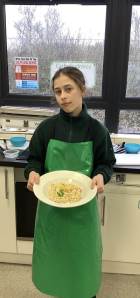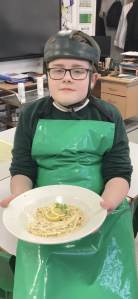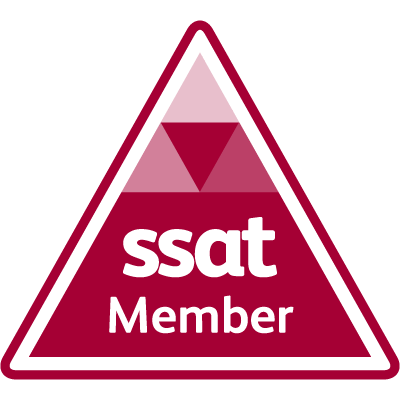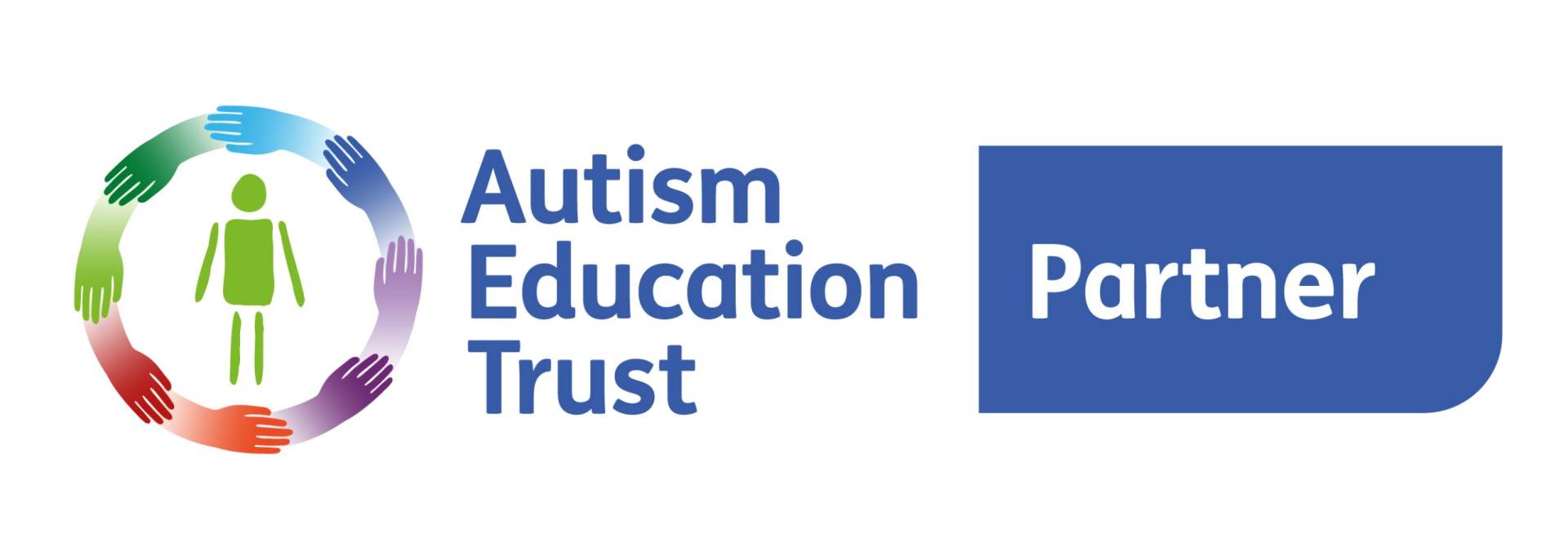Food Preparation and Nutrition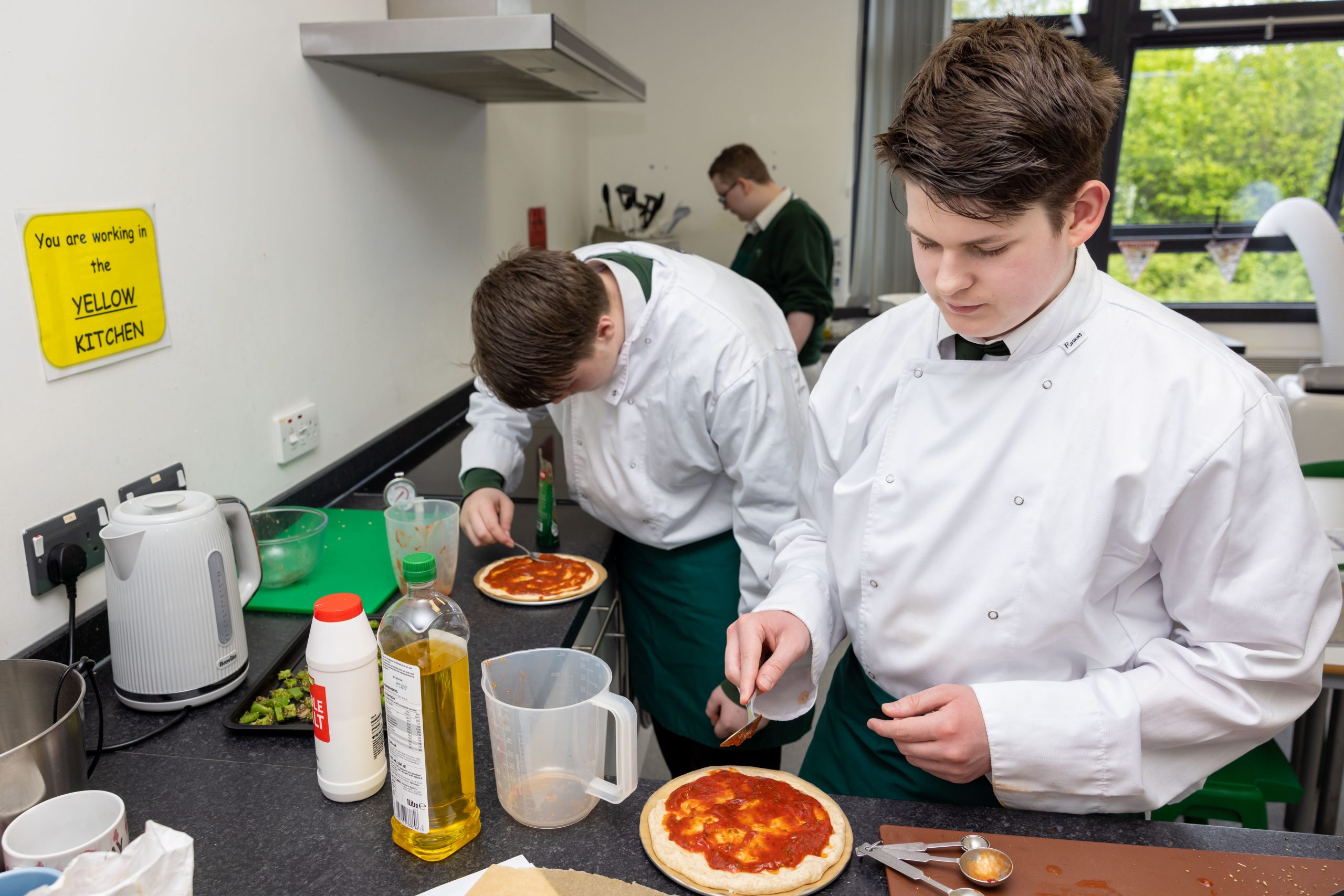
Food Preparation Curriculum Map
Chefs don't make mistakes; they make new dishes.
Elizabeth Brigg
At Hollinwood Academy, the intent of our Food Preparation and Nutrition curriculum is to empower students with essential life skills that promote healthy, independent living. Through a blend of practical cookery skills and engaging theoretical knowledge, our students discover how food impacts their health and well-being, enabling them to make informed choices about their diets.
In line with our school’s heartfelt mission, “Learning together, learning for all, learning for life,” our curriculum is thoughtfully designed to be inclusive and responsive to the diverse needs of students with Autism Spectrum Condition (ASC) and Speech, Language, and Communication Needs (SLCN). By fostering both confidence and competence in food preparation, we aim to nurture students who feel empowered to reach their full potential and actively participate in their communities.
Our curriculum balances hands-on cooking with theoretical lessons, starting with the fundamentals of food safety and hygiene before progressing to more complex topics like nutrition, food provenance, and food science. This careful sequencing ensures that students build on foundational knowledge while developing practical skills, fostering a sense of independence that extends beyond the classroom.
We embrace key elements of the National Curriculum, such as nutrition, food safety, and cooking techniques, to prepare students for the journey of independent living. Additionally, we incorporate sustainability and food provenance to help them understand the broader context of the food system and its impact on our world.
Inclusivity is at the heart of our curriculum, featuring differentiated lessons and sensory considerations that support all learners. We use structured routines, visual aids, and scaffolding to ensure that every student can participate fully and thrive. Vocabulary is explicitly taught and integrated throughout our lessons, allowing students to learn important subject-specific terms related to nutrition, cooking methods, food science, Provenance, food choice and food safety. By utilising visual aids, hands-on activities, and real-life examples, we reinforce this vocabulary in meaningful ways, helping students confidently apply these essential terms during their cooking experiences.
Ultimately, our curriculum prepares students for their next steps by equipping them with the skills needed for independent living. A GCSE in Food Preparation and Nutrition can put students on a pathway for a career in various fields in the hospitality industry or careers in Food Technology, Health and Safety Inspection, Food Scientist, Dietician, Nutritional Therapy, Nutrition and Food Teacher.
Food Preparation and Nutrition Lessons at Hollinwood Academy
Key Stage 3
In the Food Preparation and Nutrition lessons at Hollinwood Academy, we follow the 2014 National Curriculum in England. Our aim is to provide our young people with a comprehensive understanding of working at Key Stage 3, ensuring they attain theoretical knowledge and develop practical skills.
Throughout their learning journey, nutrition holds a significant focus. We believe that it is crucial for young people to comprehend the importance of maintaining a balanced diet.
In Year 7, our young people are introduced to practical skills to enhance their confidence in knife safety, weighing and measuring ingredients, as well as following a diverse range of recipes independently. Concurrently, they engage in theory work, covering health and safety, the science of Enzymic browning, the Eatwell Guide, and the process of following recipes accurately.
Building upon their foundational skills, Year 8 young people further develop their practical expertise by working with a wide range of kitchen equipment, including electrical appliances. They also learn to follow recipes that incorporate carbohydrates and practice various water-based cooking methods. Concurrently, they explore theory work covering the science of cooking, different cooking methods, food poisoning, storage cross-contamination, and the significance of proteins.
Year 9 young people gain more confidence in their culinary abilities as they delve into the art of sauce making, breadmaking, and pastry making. They are exposed to a wider array of recipes that allow them to refine their skills in these areas. In terms of theory work, they deepen their understanding of the science behind sauce-making, the process of breadmaking, sensory analysis, raising agents, the importance of fiber, fats, and shortening.
At Hollinwood Academy, we are dedicated to nurturing our young peoples' passion for food preparation and nutrition. We ensure that they are equipped with both theoretical knowledge and practical skills, empowering them to make informed choices regarding their diet and future culinary endeavors.
Key Stage 4
At Hollinwood Academy, our food preparation and nutrition lessons follow the 2014 National Curriculum in England, with a particular focus on the AQA Food Preparation and Nutrition specification in Key Stage 4.
In KS4, we fully embrace the AQA Food Preparation and Nutrition specification, which includes both practical work and coursework for the non-exam assessment (NEA). The NEA contributes to 50% of the final grade, while the remaining 50% is determined by a written exam.
The NEA comprises two tasks assigned by the AQA. The first task, known as the Food Investigation, involves developing an understanding of the working characteristics, functional properties, and chemical properties of ingredients. The second task, the Food Preparation Assessment, assesses young people' knowledge and understanding of planning, preparation, cooking, and presentation of food and nutrition.
By following this curriculum and specification, we aim to provide our young people at Hollinwood Academy with a comprehensive education in food preparation and nutrition, equipping them with valuable skills and knowledge for their future endeavors.
Schemes of Work
At Hollinwood Academy, our Food Preparation and Nutrition scheme of work is expertly tailored to meet the unique needs of our young people at Key Stage 3. Designed in accordance with the 2014 National Curriculum in England, it encompasses a bespoke syllabus to ensure effective progression.
The curriculum is delivered through both practical and theoretical methods, enabling young people to develop knowledge and confidence. Our curriculum not only allows young people to prepare a range of delicious and nutritious meals but also helps them understand what happens to ingredients when prepared and cooked in particular ways. As a result, young people become informed and thoughtful consumers of food.
At Key Stage 4, we align with the AQA Food Preparation and Nutrition specification, which prepares young people for their future pathways and equips them with the necessary knowledge and skills.
Throughout the curriculum, young people will explore a range of engaging topics. These include Food, Nutrition, and Health, where they will gain knowledge of nutrients, their functions, sources, and the future health implications of over and under nutrition. They will also learn how to apply this knowledge in different scenarios and across various life stages. The following topics will be covered:
Food, Nutrition and Health.
Gaining knowledge of nutrients, functions, and sources.
Understanding the future health implications of over and under nutrition.
Application of knowledge in different scenarios and life stages.
Food Science.
Gaining knowledge and understanding of the functional and chemical properties of protein, fats, and carbohydrates.
Develop a clear understanding of how to conduct scientific investigations into chemical and functional properties of ingredients.
Food Provenance.
Applying knowledge and understanding of food provenance to provide solutions to sustainable food production and food insecurity worldwide.
Food Safety.
Gaining knowledge of preparing and storing food safely.
Understanding how to prevent pathogens from causing food poisoning through temperature control.
Understanding the benefits of microorganisms in food production.
Food Choice.
Demonstrating awareness of influences on food choice. Gaining knowledge and understanding of cultural, religious, and moral food choices. Develop a clear understanding of British and international cuisine.
Home Learning
At Hollinwood Academy, we place a strong emphasis on fostering independence amongst our secondary students, especially within the food technology room. Students are actively encouraged to follow recipes autonomously, allowing them to develop valuable culinary skills.
Under the guidance of Mrs Duffy, a range of recipes with detailed visual instructions have been curated and made accessible. These resources aim to empower students to replicate the cooking process independently at home.
We invite parents to support their child in practising these recipes at home, giving them an opportunity to showcase their culinary abilities and share their final creations. We encourage families to document and upload this home learning journey on Evidence for Learning. It is rewarding to witness students applying their food technology skills beyond the classroom.
Assessment
At Hollinwood Academy, we follow the 2014 National Curriculum in England and employ a comprehensive approach to assessing every young person's progress in Food Preparation and Nutrition. Our assessments are designed to align with the curriculum and are based on the Hollinwood Academy Food Preparation and Nutrition schemes of work.
At key stage three, we focus on both practical and theoretical topics. For example, in year 7, young people learn a range of dishes to demonstrate knife skills, kitchen safety, and hygiene over several lessons, which helps them develop confidence. The practical skills are combined with lessons on microorganisms and safe storage, among other theoretical aspects. Each term, young people are given a practical task to showcase their skills, followed by a written task that is carried out online to demonstrate their theoretical knowledge. In the same lesson, young people receive verbal feedback and engage in discussions to make improvements.
At key stage four, young people are given a baseline exam paper and subsequently receive starter activities during theoretical lessons with instant feedback to ensure understanding. They complete an exam paper each term to assess the development of their knowledge. In practical lessons, young people receive instant feedback and also complete tasks to showcase their practical skills.
To track each young person's progress in Food Preparation and Nutrition, we set personalised progress targets, which are closely monitored. We believe in fostering a strong partnership with parents, so we share these targets with them on a termly basis via Arbor, our digital communication platform. Evidence of young people's discussions, questions, and evaluations during Food Preparation and Nutrition lessons are captured on Evidence for Learning by either the young person or the teacher.
Qualifications
In KS4 we follow the AQA Food Preparation and Nutrition specification.
GCSE Food Preparation and Nutrition
The assessment for this qualification consists of both non-exam assessment and a written exam. The non-exam assessment contributes to 50% of the final grade, which includes practical work and coursework. The remaining 50% is based on a written exam.
Young people will focus on two non-exam assessment tasks determined by the AQA.
NEA1 – Food Investigation – Understanding of the working characteristics, functional and chemical properties of ingredients.
NEA2 – Food Preparation Assessment – knowledge and understanding in relation to the planning, preparation, cooking and presentation of food and nutrition.
Future Pathway.
Completing this GCSE in Food Preparation and Nutrition provides young people with a solid foundation for future pathways in employment. It equips them with the necessary skills for careers involving food preparation, cooking, or food manufacture.
Moreover, this qualification also opens up opportunities for young people interested in pursuing careers as a dietician, nutritionist, healthcare professional, medical practitioner, child caregiver, personal trainer, or food scientist.
By choosing Food Preparation and Nutrition at Hollinwood Academy, young people can explore their passion for culinary arts and foster their understanding of food science, catering to a variety of future career aspirations.
Revision Guide
GCSE Food Preparation and Nutrition for AQA (Grade 9-1) ISBN: 978-1382029148
Technology
We believe in the power of technology to enhance learning, and we have made it an integral part of our food preparation and nutrition curriculum. At the secondary stage, we embrace the use of iPads and other technological tools, enabling all young people to engage actively with their learning. By utilising these resources, we aim to remove barriers and make food preparation and nutrition accessible for every young person.
All young people have access to a wide range of interactive food preparation and nutrition and learning apps, including:
www.jamieshomecookingskills.com
Wider curriculum and celebrations

Year 10s were so excited to put their whites on today to produce a ravioli dish with Alaskan Salmon. They made a pasta from scratch using '00' flour and egg. They filled the ravioli with salmon, zested lemon, Dill and ricotta. Then they produced a dill, cream sauce. The ravioli was seriously melt in the mouth, so delicious.
Fish Heroes Programme Year 10
Pupils showed of their culinary skills today by preparing and cooking Salmon linguine. The year 9 students were able to challenge themselves by experimenting with new flavours, textures, and aromas. We are proud, not only of their culinary skills but also that they were able to overcome a range of sensory issues due to these and other needs . The Salmon was provided courtesy of AlaskaSeafoodUK. Thankyou.
The Salmon was provided as part of the national #FishHeroes programme. Watch this space for more delicious fishy dishes @FoodTCentre @FishmongerCo #FishHeroes #hollinwoodacademy. #newbridge #fishheroes
Fish Heroes Programme





